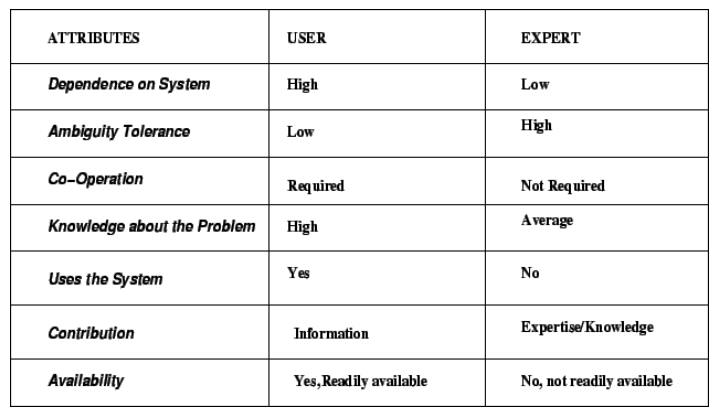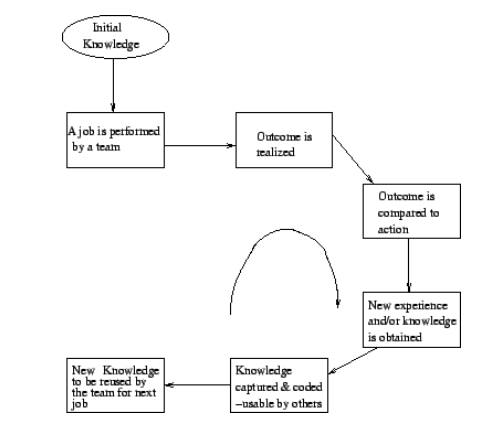Chapter: Knowledge Management
Knowledge Management
KNOWLEDGE MANAGEMENT
1 KM Myths
2 KM Life Cycle
3 Understanding Knowledge
4 Knowledge, intelligence
5 Experience
6 Common Sense
7 Cognition and KM
8 Types of Knowledge
9 Expert Knowledge
10 Human Thinking and Learning
1 KM Myths
ü Knowledge Management Systems Life Cycle.
ü Knowledge Creation and Knowledge Architecture.
ü Capturing Tacit Knowledge
ü Knowledge Codification
ü System Testing and Development
ü Knowledge Transfer and Knowledge Sharing
ü Knowledge Transfer in the E-World
ü Learning from Data
ü Knowledge Management Tools and Knowledge Portals
ü Managing Knowledge Workers
2 KM Life Cycle
Key Differences:
The systems analyst gathers data and information from the users and the users depend on analysts for the solution.
The knowledge developer gathers knowledge from people with known knowledge and the developer depends on them for the solution.
The main interface for the systems analyst is associated with novice users who knows the problem but not the solution.
The main interface for the knowledge developer is associated with the knowl- edgeable person who knows the problem and the solution.
Conventional systems development is primarily sequential, whereas KMSLC is incre-mental and interactive.
In case of conventional systems, testing is usually done towards the end of the cycle (after the system has been built), whereas in KMSLC, the evolving system is verified and validated from the beginning of the cycle.
Systems development and systems management is much more extensive for conven- tional information systems than it is for KMSLC.
The conventional systems life cycle is usually process-driven and documentation- oriented whereas KMSLC is result-oriented.
The conventional systems development does not support tools such as rapid prototyping since it follows a predefined sequence of steps
KMSLC can use rapid prototyping incorporating changes on the spot.

Key Similarities:
Both cycles starts with a problem and end with a solution.
The early phase in case of conventional systems development life cycle starts with information gathering.
In KMSLC the early phase needs knowledge capture.
Verification and validation of a KM system is often very similar to conventional systems testing. Both the systems analyst and the knowledge developer needs to choose the appropriate tools for designing their intended systems.
3 Understanding Knowledge
Knowledge can be defined as the ``understanding obtained through the process of experience or appropriate study.''
Knowledge can also be an accumulation of facts, procedural rules, or heuristics. A procedural rule is a rule that describes a sequence of actions.
A fact is generally a statement representing truth about a subject matter or domain. A heuristic is a rule of thumb based on years of experience.
Intelligence implies the capability to acquire and apply appropriate knowledge.
Memory indicates the ability to store and retrieve relevant experience according to
will.
Learning represents the skill of acquiring knowledge using the method of instruction study.
Experience relates to the understanding that we develop through our past actions. Knowledge can develop over time through successful experience, and experience can lead
to expertise.
Common sense refers to the natural and mostly unreflective opinions of humans.
4 Knowledge, intelligence
Knowledge can be defined as the ``understanding obtained through the process of experience or appropriate study.''
Knowledge can also be an accumulation of facts, procedural rules, or heuristics. A procedural rule is a rule that describes a sequence of actions.
A fact is generally a statement representing truth about a subject matter or domain. A heuristic is a rule of thumb based on years of experience.
Intelligence implies the capability to acquire and apply appropriate knowledge.
Memory indicates the ability to store and retrieve relevant experience according to
will.
Learning represents the skill of acquiring knowledge using the method of instruction/
study.
5 Experience
Experience relates to the understanding that we develop through our past actions. Knowledge can develop over time through successful experience, and experience can lead to expertise.
Common sense refers to the natural and mostly unreflective opinions of humans.
6 Common Sense
Common sense refers to the natural and mostly unreflective opinions of humans
7 Cognition and KM
ü Cognitive Psychology
ü Data, Information and Knowledge
ü Kinds of Knowledge
ü Expert Knowledge
ü Thinking and Learning in Humans

7.1 Cognitive Psychology
Cognitive psychology tries to identify the cognitive structures and processes that closely relates to skilled performance within an area of operation.
It provides a strong background for understanding knowledge and expertise. In general, it is the interdisciplinary study of human intelligence.
The two major components of cognitive psychology are:
7.2 Experimental Psychology:
This studies the cognitive processes that constitutes human intelligence.
7.3 Artificial Intelligence(AI):
This studies the cognition of Computer-based intelligent systems.
The process of eliciting and representing experts knowledge usually involves a knowledge developer and some human experts (domain experts).
In order to gather the knowledge from human experts, the developer usually interviews the experts and asks for information regarding a specific area of expertise.
It is almost impossible for humans to provide the completely accurate reports of their mental processes.
The research in the area of cognitive psychology helps to a better understanding of what constitutes knowledge, how knowledge is elicited, and how it should be represented in a corporate knowledge base.
Hence, cognitive psychology contributes a great deal to the area of knowledge management.
8 Types of Knowledge
Deep Knowledge:
Knowledge acquired through years of proper experience. Shallow Knowledge: Minimal understanding of the problem area.Knowledge as Know-How: Accumulated lessons of practical experience.
Reasoning and Heuristics: Some of the ways in which humans reason are as follows: Reasoning by analogy: This indicates relating one concept to another.
Formal Reasoning: This indicates reasoning by using deductive (exact) or inductive reasoning.
Deduction uses major and minor premises.
In case of deductive reasoning, new knowledge is generated by using previously specified knowledge.
Inductive reasoning implies reasoning from a set of facts to a general conclusion.
Inductive reasoning is the basis of scientific discovery. A case is knowledge associated with an operational level.
Common Sense: This implies a type of knowledge that almost every human being possess in varying forms/amounts.
We can also classify knowledge on the basis of whether it is procedural, declarative, semantic, or episodic.
Procedural knowledge represents the understanding of how to carry out a specific procedure.
Declarative knowledge is routine knowledge about which the expert is conscious. It is shallow knowledge that can be readily recalled since it consists of simple and
1 Kinds of Knowledge
Uncomplicated information. This type of knowledge often resides in short-term memory.
Semantic knowledge is highly organized, ``chunked'' knowledge that resides mainly in long-term memory. Semantic knowledge can include major concepts, vocabulary,
facts, and relationships.
Episodic knowledge represents the knowledge based on episodes (experimental information). Each episode is usually ``chunked'' in long-term memory.
Another way of classifying knowledge is to find whether it is tacit or explicit Tacit knowledge usually gets embedded in human mind through experience.
Explicit knowledge is that which is codified and digitized in documents, books, reports, spreadsheets, memos etc.
9 Expert Knowledge
It is the information woven inside the mind of an expert for accurately and quickly solving complex
problems.
9.1 Knowledge Chunking
Knowledge is usually stored in experts long-range memory as chunks. Knowledge chunking helps experts to optimize their memory capacity and enables
them to process the information quickly.
Chunks are groups of ideas that are stored and recalled together as an unit.
9.2 Knowledge as an Attribute of Expertise
In most areas of specialization, insight and knowledge accumulate quickly, and the criteria for expert performance usually undergo continuous change.
In order to become an expert in a particular area, one is expected to master the necessary knowledge and make significant contributions to the concerned field.
The unique performance of a true expert can be easily noticed in the quality of decision making.
The true experts (knowledgeable) are usually found to be more selective about the information they acquire, and also they are better able in acquiring information in a less structured situation.
They can quantify soft information, and can categorize problems on the basis of solution procedures that are embedded in the experts long range memory and readily available on recall.
Hence, they tend to use knowledge-based decision strategies starting with known quantities to deduce unknowns.
If a first-cut solution path fails, then the expert can trace back a few steps and then proceed again.
Expert Knowledge
Nonexperts use means-end decision strategies to approach the the problem scenario. Nonexperts usually focus on goals rather than focusing on essential features of the task which makes the task more time consuming and sometimes unreliable.
Specific individuals are found to consistently perform at higher levels than others and they are labeled as experts.
10 Human Thinking and Learning.
Research in the area of artificial intelligence has introduced more structure into human thinking about thinking.
Humans do not necessarily receive and process information in exactly the same way as the machines do.
Humans can receive information via seeing, smelling, touching, hearing (sensing) etc., which promotes a way of thinking and learning that is unique to humans.
On macro level, humans and computers can receive inputs from a multitude of sources. Computers can receive inputs from keyboards, touch screens etc.
On micro level, both human brain and CPU of a computer receive information as electrical Impulses The point to note here is that the computers must be programmed to do specific tasks. Performing one task does not necessarily transcend onto other tasks as it may do with humans. Human learning: Humans learn new facts, integrate them in some way which they think is relevant and organize the result to produce necessary solution, advice and decision. Human learning can occur in the following ways:
ü Learning through Experience.
ü Learning by Example.
ü Learning by Discovery.